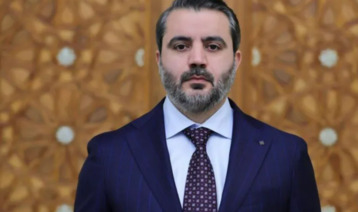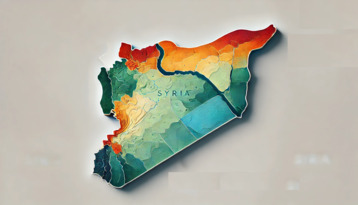-
Does Fakherjie's Dismissal Represent Silencing Voices in the New Syria?
-
The decision to remove Fawakherjie from the Artists Syndicate reveals the continued approach of excluding dissenters despite the change in authority, raising fears of replacing one tyranny with anothe

The Syrian Artists Syndicate has removed actress Sulaf Fawakherjie from its lists on the pretext of her denial of the previous Syrian regime's violations, in a move that raises profound questions about the extent of the interim authorities' commitment to the principles of freedom of expression they claim to adopt.
These measures reflect the continued approach of exclusion and accusations of treachery against political dissenters, with only a change in the identity of those practicing this exclusion, threatening to establish a new cycle of polarization and societal division.
The Syrian newspaper "Al-Watan" reported the text of the syndicate's decision, which stated: "The registration of artist Sulaf Fawakherjie is deleted for deviating from the syndicate's objectives due to her insistence on denying Assad's crimes and her disregard for the pain of the Syrian people."
The wording of the decision shows exclusionary language that lacks the professionalism and neutrality expected in a syndicate institution that should represent all its members regardless of their political orientations, and respect their right to express their opinions.
The decision carried the signature of the head of the Syrian Artists Syndicate, Mazen Al-Natour, embodying the transformation of professional syndicates into political tools rather than professional bodies serving their members.
This decision highlights a stark contradiction between the slogans of freedom and democracy promoted by the new interim authorities and their actual practices that perpetuate a culture of rejection and exclusion.
Punishing artists for their opinions and political convictions represents a setback for freedom of expression, which was long advocated by opponents of the previous regime, raising fears of replacing one tyranny with another.
According to observers, there should be space for public discussion about evaluating the past and holding those responsible for crimes accountable, instead of forcibly imposing a single narrative and silencing dissenting voices through arbitrary administrative decisions.
You May Also Like
Popular Posts
Caricature
BENEFIT Sponsors Gulf Uni...
- April 17, 2025
BENEFIT, the Kingdom’s innovator and leading company in Fintech and electronic financial transactions service, has announced its sponsorship of the “Innovation and Sustainable Technology Solutions Competition (GU - IST Solutions), hosted by Gulf University at its main campus.
This strategic sponsorship reflects BENEFIT’s active role in advancing technological innovation and fostering sustainable solutions to future challenges. It also seeks to empower Bahraini youth by enhancing their skills, capabilities, and competitiveness in innovation and solution development—contributing meaningfully to the broader goals of sustainable development across all sectors.
As part of BENEFIT’s active involvement in the competition, the company has announced that Hanan Abdulla Hasan, Senior Manager of Public Relations and Communication, will serve on the competition’s supervisory committee. Her upcoming participation reflects BENEFIT’s forward-looking commitment to championing academic and professional excellence.
Commenting on the occasion, Hanan Abdulla Hasan, Senior Manager of Public Relations and Communication at BENEFIT, said, “We are privileged to support this pioneering initiative, which aligns seamlessly with BENEFIT’s enduring commitment to fostering innovation and nurturing the potential of Bahrain’s youth. Our participation is rooted in a deep sense of social responsibility and a firm belief in the pivotal role of innovation in shaping a sustainable future. Through such platforms, we seek to empower the next generation with the knowledge, skills, and foresight required to develop impactful solutions that address future challenges, in line with the United Nations Sustainable Development Goals 2030.”
Dr. Aseel Al Ayash Dean of the College of Engineering in Gulf University commented, “We extend our sincere gratitude to BENEFIT for their generous sponsorship and support of the Innovation and Sustainable Technology Solutions Competition. This contribution plays an instrumental role in helping us achieve the strategic goals of this initiative, namely, cultivating a culture of innovation and sustainability, encouraging efforts that address the imperatives of sustainable development, and enhancing the practical and professional capabilities of our students and participants.”
The event will bring together a diverse spectrum of participants, including secondary school students, university undergraduates, engineers, industry professionals, entrepreneurs, academic researchers, and subject matter experts representing a wide range of disciplines.
The competition seeks to inspire participants to develop and present innovative, sustainable technologies aimed at addressing pressing environmental, social, and economic challenges. It encourages the formulation of business models that integrate advanced technological solutions with core principles of sustainability. Moreover, it serves as a platform for emerging leaders, entrepreneurs, and innovators to contribute to the advancement of the Sustainable Development Goals, promote the ethos of responsible technology, and demonstrate its transformative potential across various sectors.
Attendees will have the opportunity to view a series of project presentations submitted by participants, covering diverse areas such as eco-friendly product design, smart and sustainable innovations, renewable energy technologies, water conservation and management, waste minimisation and recycling, green architectural solutions, and sustainable transportation systems. Outstanding projects will be formally recognised and awarded at the conclusion of the event.
opinion
Report
ads
Newsletter
Subscribe to our mailing list to get the new updates!






















